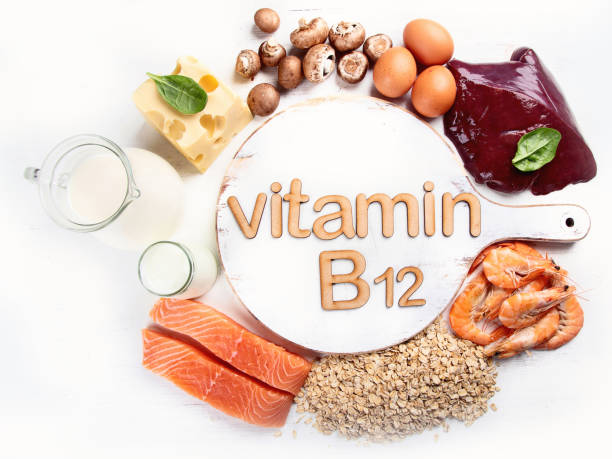Vitamin B12: Important Health Benefits You Should Know About
The health of your brain system and red blood cells depend on vitamin B12. Fortified meals and several animal products include it. Stocksy United/Helen RushbrookApproximately 6% of those under 60 and 20% of those over 60 in the US lack enough vitamin B12. Inadequate intake of vitamin B12 may result in anemia and severe neurological disorders.Many animal products and fortified meals include vitamin B12, which you may obtain if you need to take more of it. A medical practitioner may occasionally recommend injectables or oral pills to assist raise your vitamin B12 levels.You may find out more about the advantages of vitamin B12 here, in addition to the details provided here.
Why is vitamin B12 necessary?
Although your body cannot synthesize vitamin B12, it is still a vital nutrient. Rather, it occurs naturally in a variety of animal-based goods. There are several bodily activities that require vitamin B12, including:
preserving your mental capacity; controlling and synthesizing DNA; generating energy; and preserving the health of your brain and neurological system. Your liver reserves additional vitamin B12 Trusted Source for periods when you don’t eat as much of it. But you can suffer detrimental consequences to your health if such reserves are depleted.
What occurs if you have low vitamin B12 levels?
Low amounts of vitamin B12 might result in symptoms like the following:

1.Tingling in the feet and hands
2.Walking with difficulty, disorientation, and memory loss
3.Melancholy and agitation
4.Issues with taste, smell, or vision
5.Pounding in the heart
6.Exhaustion headaches
7.Pale skin loss of weight
8.The painful, silky, red tongue known as glossitis
In order to avoid anemia, low vitamin B12 levels must be treated. Megaloblastic anemia is a specific kind of anemia that is linked to vitamin B12. If you don’t get enough vitamin B12, you might get anemia, which is when your red blood cells become bigger and more oval-shaped than normal. The red blood cells may not flow from your bone marrow into your bloodstream at the normal pace due to their atypical form.
Is it beneficial for you to take B12 daily?
The recommended daily allowance of vitamin B12 for the majority of individuals is 2.4 micrograms (mcg)Reliable Source. For those who are breastfeeding a baby or pregnant, the recommended dosage is 2.6 mcg per day. Also, babies less than six months only require 0.4 mcg each day. It is soluble in water, vitamin B12. Any excess B12 that your body stores for two to five years will be released in your urine. Many people’s daily diets include enough amounts of vitamin B12. But vegans and vegetarians may need to eat meals that are fortified with vitamin B12, as it is not naturally found in plant-based foodsTrusted Source. Vitamin B12 is usually absorbed by your body in two stages.
First, B12 is separated from the protein it is bound to by the acid in your stomach. Next, in the ileum, the last segment of your small intestine, the B12 mixes with a protein in your stomach known as the intrinsic factor, which is then absorbed by your body. The initial step of this process could be skipped by your body if you take vitamin B12 supplements. This implies that you could benefit more from injections.
In order to boost your vitamin B12 level if you are deficient in it, a medical practitioner could advise getting injections. Injections of vitamin B12 are also known as hydroxocobalamin in the US. You could require an injection every other day for two weeks, or until your symptoms start to improve, if your low vitamin B12 level is the cause of your anemia. Doctors frequently prescribe injections to address B12 shortage resulting from medical conditions, as diet modifications and supplements may not be useful in correcting the shortfall.
Which sources of vitamin B12 are the best?
Foods rich in B12 (ascorbic acid) include: Fish and shellfish, including oysters, clams, and salmon; lean beef; and chicken; fortified cereals for breakfast hens dairy items, including yogurt, cheese, and milk.
Exist any potential negative consequences from vitamin B12?
Even at large concentrations, vitamin B12 is not commonly regarded as a toxicTrusted Source. However, injections of vitamin B12 may have some adverse consequences, including: Edema, discomfort, and redness at the injection site. Nausea, vomiting, vertigo, and headaches It’s crucial to notify your doctor if you have any severe adverse effects after a vitamin B12 injection, such as palpitations in the heart.
Does taking vitamin B12 impact how you eat?
Constipation and diarrhea may be brought on by low vitamin B12 levels (Trusted Source). Furthermore, low vitamin B12 levels might hinder your red blood cells’ ability to carry adequate oxygen to your digestive system. Gas, bloating, vomiting, and nausea may result from this.
Conclusion
The neurological system and cells in your body depend on vitamin B12. Fatigue, tingling in the hands and feet, and problems with mental function can all be signs of low vitamin B12 levels.
Consuming fortified meals and some animal products can increase your intake of vitamin B12. A medical expert could suggest injections or oral supplements if your vitamin B12 level is low.
